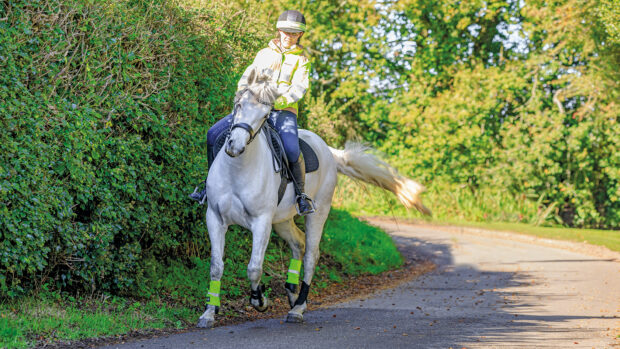From improving skin and hair condition to enhancing athletes’ performance, coconut oil has been hailed as having health benefits for humans, but can it help your horse, too?
You may have already incorporated coconut oil into your own life, but can its benefits extend beyond human purposes — from cooking and beauty treatments — to helping support your horse’s performance while also improving the condition of their coat?
Garry Striven, managing director of Coconoil, says that by using the virgin coconut oil, it could help support horses suffering with conditions such as mud fever, and a challenged gut or immune system.
Research* suggests that one of the reasons coconut oil has become so popular with human athletes is that it’s more readily used by the body as a fuel than other fats, and can therefore help with endurance performance.
“Research has shown this phenomenon appears to also apply in equines,” says Garry.
“In one study scientists found that when horses were fed diets containing either a high carbohydrate mix, a mix with 10 per cent soybean oil, 10 per cent coconut oil, or a mixture of soybean oil (five per cent) and coconut oil (five per cent), and then performance tested, those on the coconut oil produced less lactate, when galloping, than those on other feeds.
“A build-up of lactate, a by-product of using glucose as fuel, causes pain in muscles and therefore reduces performance.”
Researchers believe that the fats in coconut oil are broken down more quickly than those in other oils and fats and utilised as fuel rather than glucose, thus reducing the amount of lactate produced and increasing exercise performance.
“We’ve been selling organic virgin coconut oil for humans for over a decade, but recently as new research has begun to highlight its potential benefits for horses, we’ve seen an ever growing demand for it in the equestrian world,” says Garry.
What the veterinary expert thinks…
Vet Simon Joyner (MRCVS), of Western Counties Equine Hospital in Devon, says he feels that the true benefits of coconut oil is an area where more research is needed.
“Vets in our practice have used coconut oil in feed as an energy source, especially in old underweight horses and those horses prone to ‘tying up’,” says Simon. “This is where it allows a reduction in carbohydrate/starch based feeds. It has benefits that it is palatable and not prone to rancidity.
“There is evidence that horses deriving a proportion of their energy from oils/fats may have increased performance, but I am yet to be convinced personally that this is specific to or increased with coconut oil — although the composition of the oil is suitable as an energy source.
“We must also be aware that the average horse in the UK is overweight and not an elite endurance athlete and need fewer calories rather than more,” he adds.
“Regarding the topical antimicrobial properties, I am not convinced either. In horses not suffering from mud fever I’m not a fan of interfering with the skin more than necessary,” he points out. “Whether that is by washing/drying or by the application of oil/barrier creams. In horses with mud fever in my opinion barrier creams/oils are unhelpful as the bacteria (and mud fever is a bacterial not fungal infection) can multiply quite happily under the barrier cream.”
What the equine nutritionist says….
David Frape, a leading authority on equine nutrition, says: “Virgin coconut oil is an unusual vegetable oil, as 60 per cent of its fatty acid content is made up of medium chain fatty acids, without trans fats.
“It is bland and readily consumed by fussy horses or dogs. It stores well and does not generate off-tastes. Virgin coconut oil is more easily digested than are most other fats or vegetable oils.
“It is useful for sick animals with malabsorption ailments, is excellent in training for endurance work and forestalling exhaustion. It preserves insulin sensitivity and should be useful in horses at risk of developing equine metabolic syndrome and type two diabetes, osteochondritis dissecans (OCD) and laminitis — so it’s a useful adjunct for horse husbandry.”
Like this? You might also enjoy reading these:
Turmeric for horses: what is all the fuss about?
7 of the best short-term energy boost supplements and pastes
Which coconut oil should you be looking for?
There are many coconut oils available, but there are certain factors you should look out for before you buy. Garry gives the following tips:
- Buy virgin, but not ‘extra’ virgin coconut oil. If a coconut oil is called a ‘virgin coconut oil’ it should always contain at least 45 per cent lauric acid (still check the label though). This is a type of fatty acid and is responsible for many of coconut oil’s purported benefits.
- Look for ‘cold pressed’ oils — heating coconut oil up can be detrimental to the taste, quality and health benefits of virgin coconut oil. ‘Cold pressing’ literally means just that, pressing the oil out of the coconut flesh, which means it stays in its most natural form.
- Picked, packed and pressed at source — this might not mean that the health benefits for your horse are any better, but it will mean more income goes to the local people, often in poverty stricken countries, who grow the coconuts and produce the oil.
*’Coconoil (virgin coconut oil) for horses and ponies by David Frape (2016)’




